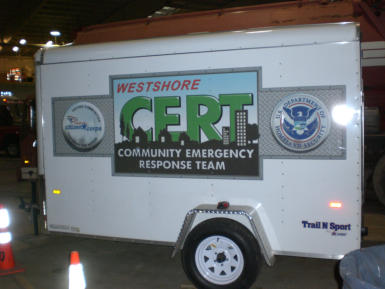










History
The Community Emergency
Response Team concept was developed
and implemented by the City of Los
Angeles Fire Department in 1985. It was
recognized that residents were
sometimes cut off from emergency
services during the early stages of local
emergencies and could be isolated for
some time after a catastrophic disaster.
With some basic training in disaster
preparedness, medical, and rescue
skills, citizens are better able to cope
and help others until professional
assistance can arrive.
The cities of Lakewood and Rocky River had started municipal teams. In 2006, Dale Kraus,
then serving as the City of Westlake Safety Officer, presented the CERT program to the Westshore
Council of Governments (WCOG). It was felt one regional team would better serve the residents.
The mayors agreed and the Westshore Regional CERT (WSC) was born. The Council is made up of
the six Westshore mayors (Bay Village, Fairview Park, Lakewood, North Olmsted, Rocky River, and
Westlake). Their purpose is to collaborate and cooperate regionally for the benefit of all residents.
Nationally, the CERT program is administrated through Citizen Corps, which falls under FEMA
and the Department of Homeland Security. First, all teams must abide by the national standards,
policies, and procedures. Second, teams follow the laws and ordinances of their sponsoring
municipality(ies) or organization. The State of Ohio and Cuyahoga County emergency management
agencies, the County Citizen Corps Council, and Cuyahoga CERT Association all share leadership
roles as well. Finally, team members follow the guidelines established for that team.
All U.S. states have teams along with certain U.S. territories and even some foreign nations. In
Cuyahoga County there are approximately 30 teams. Some operate under a single municipality
while others are regional or “closed” teams such as at Cleveland State University and Case
Western Reserve.










